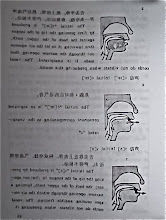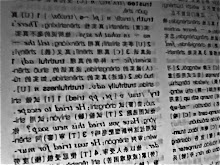Maybe it is just me, but today the word passion lacks the potency and gravity that it etymologically deserves.
I often encounter the word, in its adjectival form, bedecking classifieds for jobs: "...seeking passionate employee...." The word subsequently peppers the applicant's cover letter and résumé. Guiltily, I have done so myself. But to my ears, neither usage of passionate reveals anything substantial about the desired employee or the aspiring applicant. The word also commonly modifies the amatory, as in "passionate lover" or "passionate sex." Love better approximates the etymological passion, to be sure, but our usage seems to emphasize its carnal aspects. Then there is the empty question: "What are your passions?" This question usually implies activities, perhaps even hobbies, one enjoys outside of his or her professional identity. Call me curmudgeonly, but I think passion has greater depth.
There is one usage, however, that does retain the original sense of the word, and this usage has become sedimented in a few related terms: "The Passion of Christ," "Christ's Passion," "The Passion Narratives," or simply, "The Passion." The Passion, in Christian tradition, refers to the episodes culminating in Jesus Christ's crucifixion, from his betrayal to his trial to his actual suffering on the cross. It is the suffering throughout these events that needs the greatest stress. And it is the word suffer itself that needs most etymological emphasis.
Passion derives from the Latin verb patior, pati, passus sum, meaning "to suffer, endure, undergo, experience, allow, put up with, and (sexually) to submit." (I could find no intermediating Classical Latin noun, which is perhaps an entry for another day. Passio as a noun emerges in Late Latin.) The verb is akin to the Greek paskhein, "to suffer, endure," which itself is akin to pathos, "suffering, feeling, emotion," and more literally, "what befalls one." The Proto-Indo-European root of pati is *pei- /*pi-, "to hurt, shame, scold." (The English word fiend also comes from this root.) The Proto-Indo-European root of paskhein is *kwenth-, "to suffer, endure." I suspect there is an interesting history of cross-linguistic renderings here, but I will leave that to the professional linguists.
Let's spend a little time with pati.
First, we recognize two important cognates, patient and patience, which come from the present participle of pati—patiens, which has the sense of "one who is suffering." A "patient" at a doctor's office and the capacity for "patience" are thusly illuminated.
Second, the form of pati warrants notice. This kind of verb is known as a "deponent" or "middle voice" verb. These oddball verbs, found in Latin and Greek, among other languages, are passive in inflection but active in meaning.
I enter into the murky territory of speculation here, but I detect a certain pattern in this class of verbs. Very many of these verbs are stative, experiential, intransitive, existential. A few examples: nascor, "to be born"; dominor, "to be master"; ancillor, "to be a servant"; aquor, "to water," in the sense of "it is watered"; assellor, "to void," in the sense of "I am voided"; aborior, "to pass away"; irascor, "to be angry," in the sense of "I am enraged." The list continues.
Two related phenomena intrigue me about these verbs. The first phenomenon: many of them appear to be formed from root nouns, as if a kind of back formation. For instance, irascor is formed from its root noun, ira, "anger"; aquor from its root noun aqua, "water."
The second phenomenon is the fascinating interplay inherent in their active meaning and passive construction. Since these active verbs have passive construction, they grammatically can have no passive meaning. And, for many of these verbs, that makes perfect sense. What would the passive meaning of the active "to be born" possibly be? And that brings me to my main point. These verbal hybrids possess a strong sense of passivity precisely in their activity. They exhibit a simultaneous agency and receptivity, a "doer" who has been "done to," a "moved mover." I think this plays out compellingly in the case of pati, especially since we know its Greek companion pathos denotes "what befalls one." To suffer, to endure, to undergo, the very activity of the agent is a kind of willed passivity, receptivity, a kind of taking on, in, or into—of hardship, of harm, of pain, of opposition.
And here we have it: the very word passive comes from—you guessed it—the Latin pati.
Now, let's go back to passion. Passion could so powerfully signify something in which we so believe and which we so love that we actually suffer, endure, undergo, even permit our "being wronged," "being blamed or scorned," to use a sort of middle-voice. (We can understand why the word was used to refer to Jesus Christ's death.) This signification speaks to me of a way of life, of moral purpose, of ethical conviction, of spiritual essence, born out of rigorous reflection, woven into the sinews of the heart. And this signification, to me, surpasses any sense of "uncontrollable emotion" or "strong enthusiasm." Gandhi, Martin Luther King, Galileo, Socrates, Sojourner Truth, to name only a few—passion.
For love, we do suffer. For our professions, especially when they are driven by a larger telos, we do endure. As for art, music, literature, and their multifarious kin, we put up with a lot of hell. As the descriptivist that I am, of course I believe language is an ever-evolving edifice, always adding on new rooms, renovating old rooms, revealing rooms that appear different each time we enter them. That is its beauty. But another part of the beauty of language is its ability to be at once flexible and precise. A word with the etymological richness of passion has that potential for an exquisite precision. What is it that you so believe in that you suffer for it? That's passion.
For some of the details, thanks to my second edition Amsco Latin dictionary, etymonline.com, and the University of Texas' Linguistics Research Center's Indo-European Lexicon, which I exhort you to explore at: http://bit.ly/2HDcgC.










